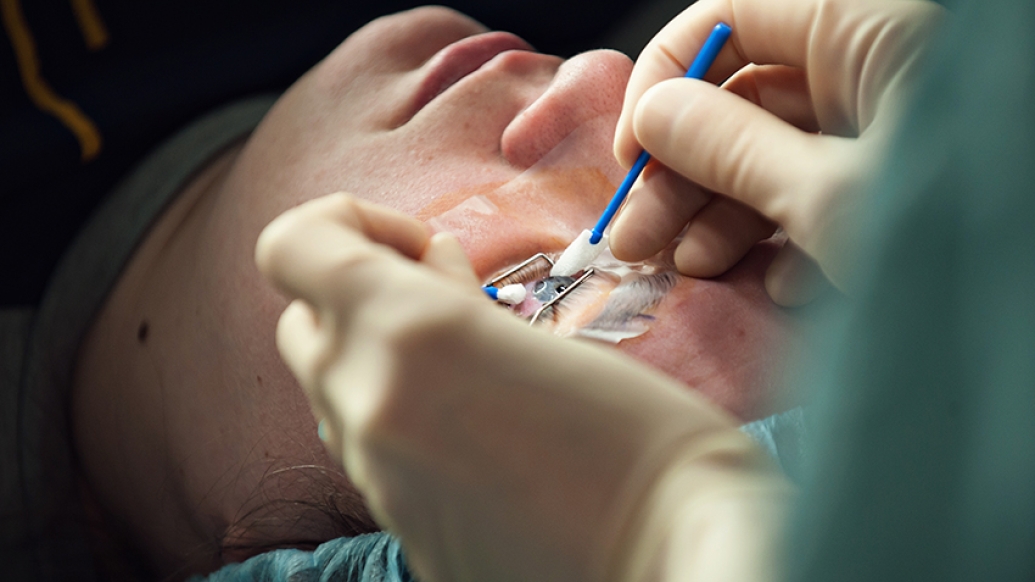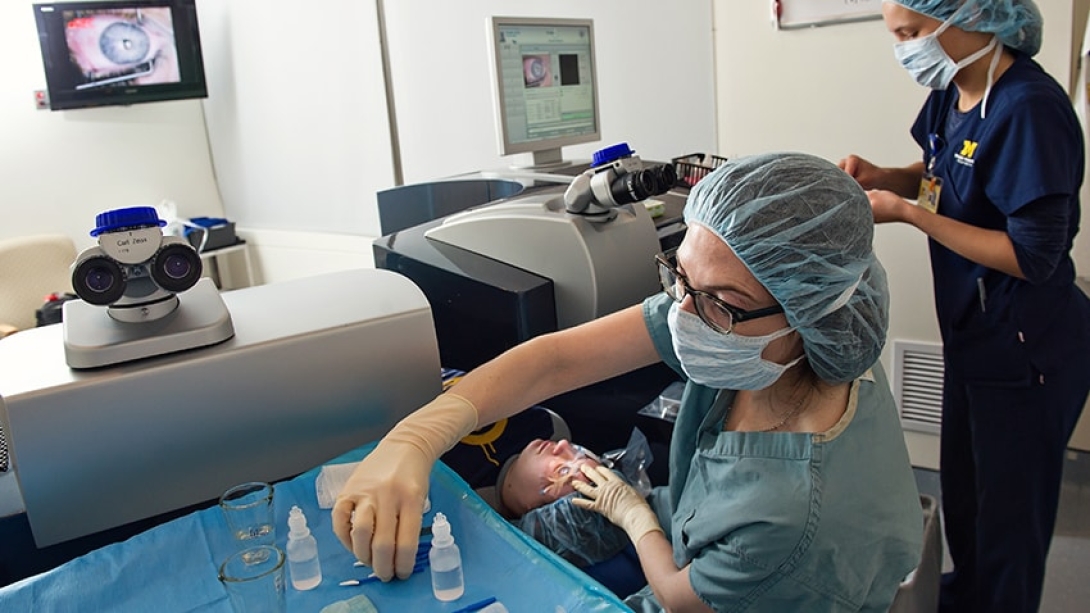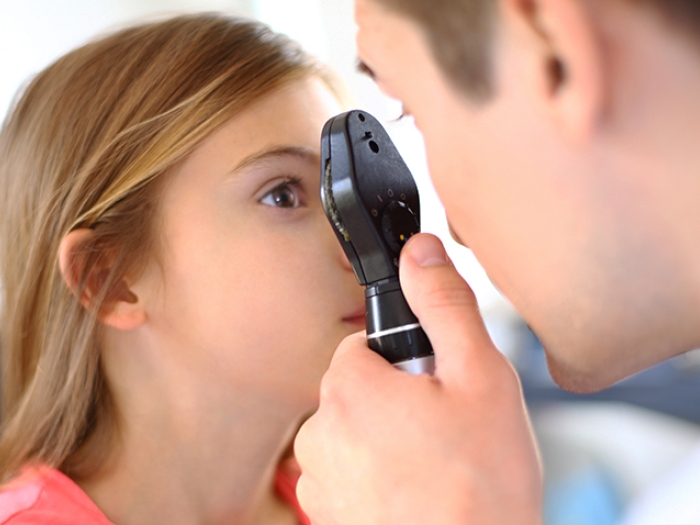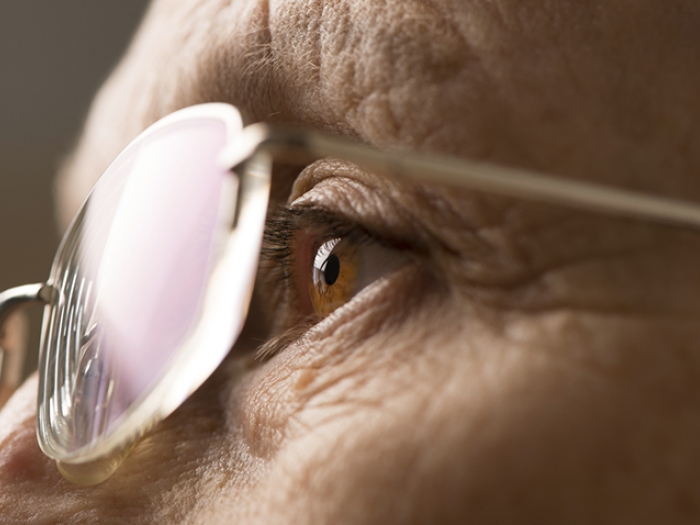Deciding to get LASIK surgery requires thought and evaluation. Here’s what an ophthalmologist tells prospective recipients
1:00 PM
Author |

This article was updated on July 3, 2023.
Patients seek LASIK surgery for many reasons.
One is near universal: "to wake up in the morning and not reach for your glasses or spend two minutes putting in contact lenses," said Christopher Hood, M.D., a clinical associate professor of ophthalmology and visual sciences at the University of Michigan Kellogg Eye Center and medical director of the Cornea, Cataract and Refractive Surgery Clinic.
MORE FROM MICHIGAN: Sign up for our weekly newsletter
Most want to enjoy work and leisure with clear vision, too.
But the idea of eye surgery — and being awake during it — can be scary. Nor is the procedure, which involves cutting a small flap in the cornea surface cells in order to reshape the cornea underneath it, right for everyone.
Others may balk at the price: The average cost per eye, according to Hood, is about $2,200.
Because LASIK isn't typically covered by insurance, some people might choose to save and pay for it via a flexible spending account. U-M's credit union also offers financing plans.
No matter the concern, "we help (patients) weigh the risks and benefits," Hood said. "For some people, it's a no-brainer."
Here, he explains several pros and cons of LASIK:
Pro: LASIK eye surgery is quick and safe
Performed as an outpatient procedure, LASIK might take about 20 minutes — "and most of that time is spent getting set up for surgery," Hood noted.
Recipients, who remain awake, may be given a Valium to calm their nerves. For protection and peace of mind, the laser is designed to shut off if a patient's eye makes any sudden movements that could prompt error or injury.
Con: Not everyone is eligible
Those deemed unsuitable often are 40 and older. That's because they may have presbyopia, where the lens of the eye becomes stiff and hinders close-up vision (LASIK alters the cornea, not the lens).
SEE ALSO: Why Does the Doctor Need a Photo of My Eye?
Another similar surgery known as photorefractive keratectomy, or PRK, can be better for people with high prescriptions or very thin corneas, Hood notes, because they lack "enough residual cornea to be structurally sound" for the flap-making that LASIK involves.
Pro: Results come quickly
It doesn't take long to gain clear sight. LASIK patients will notice a difference in a few hours. "You're seeing really, really well by the next day," Hood said. Most normal activities can resume within 48 hours.
Those who receive PRK, however, can expect a longer recovery — about a month — and some minor pain due to the corneal surface removal.

Con: Some LASIK risks are possible
Although LASIK may cause dry eyes for up to three months (and can be managed with artificial tears), the odds of it becoming a permanent issue are rare. Another uncommon side effect: nighttime glare or halos.
Still, said Hood, "the risk is much lower than it used to be and the technology is much better. The treatment zone is much larger now, covering the entire cornea."
Pro: You can live life without glasses or contacts
Whether they choose LASIK or PRK, many patients view the prospect as life-changing — and a means to enjoy even basic activities that once were hindered by poor vision.
SEE ALSO: 5 Signs Your Child Might Have Vision Problems
"For most people, something changes or prompts them to come in for surgery," Hood said. "They realize they're sick of contacts because of dry dyes or want to ride their bicycle without glasses."
Con: The flaps can be injured
Flaps created during LASIK aren't secured, so patients should not rub their eyes while they heal. Any trauma to a flap (such as getting poked by a tree branch or fingernail) could dislodge it — even years after surgery, Hood says. Visit your eye doctor immediately if such contact occurs.
Because no flaps are created via PRK, those patients don't have that risk. Athletes and active individuals might pursue that option to perform at their best.
Pro: Your vision will be greatly improved
LASIK recipients can regain 20/20 vision. Just don't expect superhuman sight: "At best, we're going to achieve what we can get with glasses or contact lenses," Hood said.
For those with higher prescriptions, that prospect may vary: "The chances of us getting a 20/20 are about 20 or 30 percent," he said, "but we have a very good chance of you functioning without glasses."
Con: There's a slight chance you'll need LASIK again
Again, those with a higher prescription prior to surgery are more likely to see a minor decrease in vision quality over time — a condition known as myopic regression.
"There can be a tendency for it to drift back, but never to the same degree," Hood said. That might require a doctor-patient discussion, he notes, as a second LASIK surgery has increased and different risks.
Photos by Leisa Thompson
For more information about LASIK or PRK surgery, call the Kellogg Eye Center at 734-615-5274 or email [email protected].

Explore a variety of health care news & stories by visiting the Health Lab home page for more articles.

Department of Communication at Michigan Medicine
Want top health & research news weekly? Sign up for Health Lab’s newsletters today!





